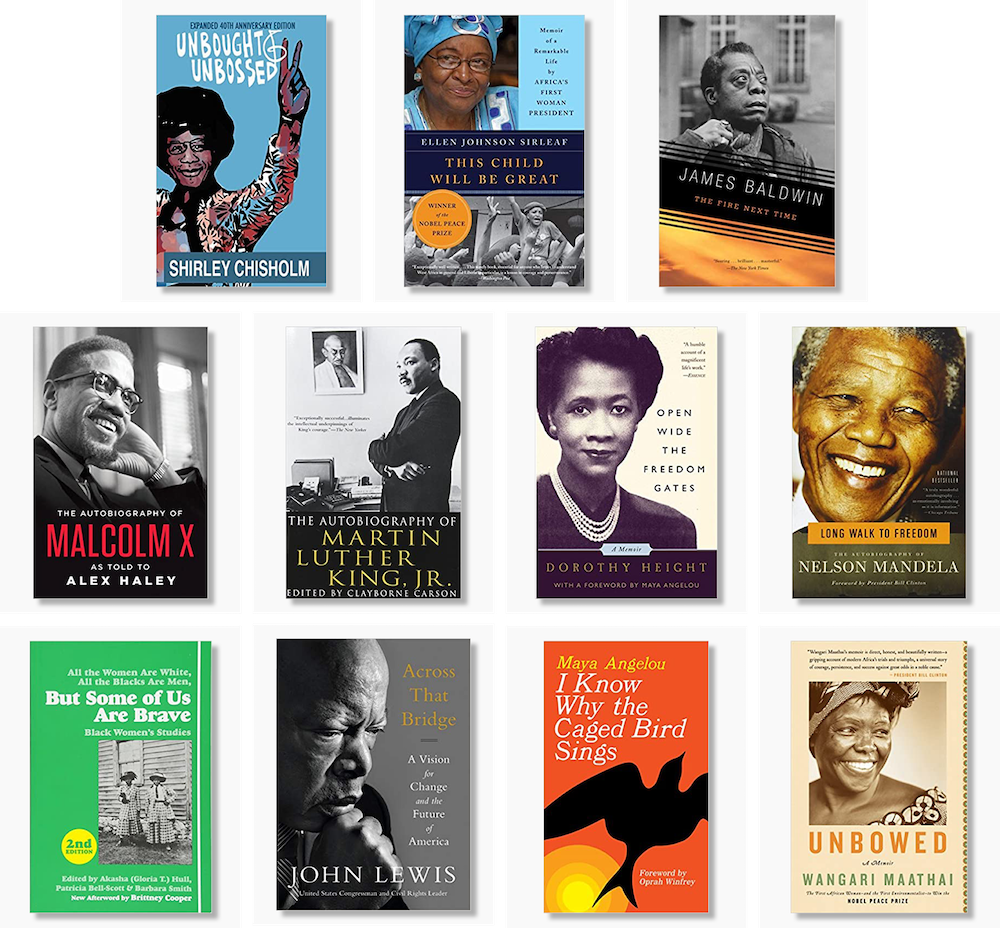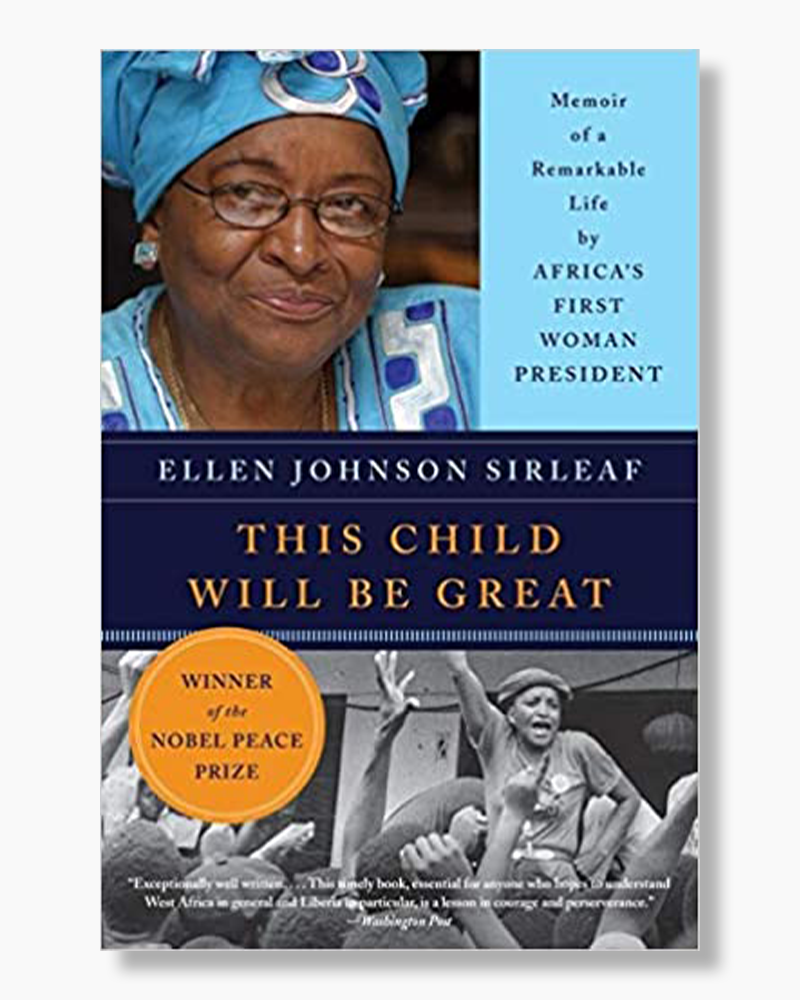
Share this Article

This Black History Month, as we've honored trade unionist and independence activist Tom Mboya and truly understood the seismic effects of the African Airlift scholarship program he pioneered, we commemorated two noteworthy recipients of the scholarship program — Nobel Peace Prize laureate Wangarĩ Muta Maathai and Ng'endo Mwangi, Kenya's first woman physician. While honoring these incredible individuals, we returned to and looked out for stories of other Africans and African Americans who have transformed the world for the better and fundamentally impacted our lives and communities.

This list of suggested reads includes autobiographies of moral and political leaders like Tom Mboya from John Lewis to Martin Luther King Jr., Malcolm X and Nelson Mandela. We returned to the works of the great African American writers in Maya Angelou's memoirs and James Baldwin's essays. We sought out stories of women like Maathai and Ng'endo, who were the firsts in their fields, from Maathai's own story in her memoir Unbowed, to the story of Ellen Johnson Sirleaf, Africa's first woman president, to Shirley Chisholm's account of her remarkable rise from young girl in Brooklyn to America's first African-American Congresswoman. In researching these extraordinary women, we came across, But Some of Us Are Brave, the first-ever Black women's studies reader and a foundational text of contemporary feminism, and the memoirs Dorothy Height's an American civil rights and women's rights activist who, unfortunately, we knew so little.
We hope that these books will profoundly affect you as they have us and challenge and inspire you this Black History Month and beyond.

Across That Bridge: A Vision for Change and the Future of America
by John Robert Lewis
In Across That Bridge, John Lewis draws from his experience as a prominent leader of the Civil Rights Movement and close confidant of Martin Luther King Jr. to offer timeless wisdom, poignant recollections, and powerful principles for anyone interested in challenging injustices and inspiring real change toward a freer and more peaceful society.
The Civil Rights Movement gave rise to the protest culture we know today, and the experiences of leaders like Lewis have never been more relevant.

But Some of Us Are Brave: Black Women's Studies
by Akasha (Gloria T.) Hull (Editor), Patricia Bell-Scott (Editor), Barbara Smith (Editor), Brittney C. Cooper (Afterword)
Published in 1982, But Some of Us Are Brave was the first-ever Black women's studies reader and a foundational text of contemporary feminism. Featuring writing from eminent scholars, activists, teachers, and writers, such as the Alice Walker, Michelle Wallace, and the Combahee River Collective, But Some of Us Are Brave challenges the absence of Black feminist thought in women's studies, confronts racism, and investigates the mythology surrounding Black women in the social sciences.

I Know Why the Caged Bird Sings
by Maya Angelou
Here is a book that is as joyous and painful, as mysterious and memorable as childhood itself. I Know Why the Caged Bird Sings captures the longing of lonely children, the brute insult of bigotry, and the wonder of words that can make the world right. Maya Angelou's debut memoir is a modern American classic beloved worldwide.
Sent by their mother to live with their devout, self-sufficient grandmother in a small Southern town, Maya and her brother, Bailey, endure the ache of abandonment and the prejudice of the local "powhitetrash." At eight years old and back at her mother's side in St. Louis, Maya is attacked by a man many times her age—and has to live with the consequences for a lifetime. Years later, in San Francisco, Maya learns that love for herself, the kindness of others, her own strong spirit, and the ideas of great authors will allow her to be free instead of imprisoned.
Poetic and powerful, I Know Why the Caged Bird Sings will touch hearts and change minds for as long as people read.

Long Walk to Freedom: The Autobiography of Nelson Mandela
by Nelson Mandela
Nelson Mandela was one of the great moral and political leaders of his time: an international hero whose lifelong dedication to the fight against racial oppression in South Africa won him the Nobel Peace Prize and the presidency of his country. After his triumphant release in 1990 from more than a quarter-century of imprisonment, Mandela was at the center of the most compelling and inspiring political drama in the world. As President of the African National Congress and head of South Africa's anti-apartheid movement, he was instrumental in moving the nation toward multiracial government and majority rule. He is still revered everywhere as a vital force in the fight for human rights and racial equality.
Long Walk to Freedom is his moving and exhilarating autobiography, destined to take its place among the finest memoirs of history's most significant figures. Here for the first time, Nelson Rolihlahla Mandela told the extraordinary story of his life — an epic of struggle, setback, renewed hope, and ultimate triumph.

Open Wide The Freedom Gates: A Memoir
by Dorothy Height
Dorothy Height marched at civil rights rallies, sat through tense White House meetings, and witnessed every major victory in the struggle for racial equality. Yet as the sole woman among powerful, charismatic men, someone whose personal ambition was secondary to her passion for her cause, she has received little mainstream recognition — until now.
In her memoir, Height, at ninety-one, reflects on a life of service and leadership. We witness her childhood encounters with racism and the thrill of New York college life during the Harlem Renaissance. We see her protest against lynchings. We sit with her onstage as Martin Luther King Jr. delivers his "I Have a Dream" speech. We meet people she knew intimately throughout the decades: W.E.B. DuBois, Marcus Garvey, Eleanor Roosevelt, Mary McLeod Bethune, Adam Clayton Powell Sr., Langston Hughes, and many others. And we watch as she leads the National Council of Negro Women for forty-one years, her diplomatic counsel sought by U.S. presidents from Eisenhower to Clinton.
After the fierce battles of the 1960s, Dr. Height concentrates on troubled black communities, on issues like rural poverty, teen pregnancy, and black family values. In 1994, her efforts were officially recognized when she received the Presidential Medal of Freedom, America's highest civilian honor.

The Autobiography of Malcolm X
by Malcolm X (Author), Alex Haley (Epilogue, Collaborator)
In the searing pages of this classic autobiography, originally published in 1964, Malcolm X, the Muslim leader, firebrand, and anti-integrationist, tells the extraordinary story of his life and the growth of the Black Muslim movement. His fascinating perspective on the lies and limitations of the American Dream, and the inherent racism in a society that denies its nonwhite citizens the opportunity to dream, gives extraordinary insight into the most urgent issues of our own time. The Autobiography of Malcolm X stands as the definitive statement of a movement and a man whose work was never completed but whose message is timeless. It is essential reading for anyone who wants to understand America.

The Autobiography of Martin Luther King, Jr.
by Martin Luther King, Jr. (Author), Clayborne Carson (Editor)
Written in his own words, this history-making autobiography is Martin Luther King: the mild-mannered, inquisitive child and student who chafed under and eventually rebelled against segregation; the dedicated young minister who continually questioned the depths of his faith and the limits of his wisdom; the loving husband and father who sought to balance his family's needs with those of a growing, nationwide movement; and the reflective, world-famous leader who was fired by a vision of equality for people everywhere.
Relevant and insightful, The Autobiography of Martin Luther King, Jr. offers King's seldom disclosed views on some of the world's greatest and most controversial figures: John F. Kennedy, Malcolm X, Lyndon B. Johnson, Mahatma Gandhi, and Richard Nixon. It also paints a rich and moving portrait of a people, a time, and a nation in the face of powerful change. Finally, it shows how everyday Americans from all walks of life confronted themselves, each other, and the burden of the past-and how their fears and courage helped shape our future.

The Fire Next Time
by James Baldwin
A national bestseller when it first appeared in 1963, The Fire Next Time galvanized the nation, gave passionate voice to the emerging civil rights movement—and still lights the way to understanding race in America today.
At once a powerful evocation of James Baldwin's early life in Harlem and a disturbing examination of the consequences of racial injustice, the book is an intensely personal and provocative document from the iconic author of If Beale Street Could Talk and Go Tell It On The Mountain.
It consists of two "letters," written on the occasion of the centennial of the Emancipation Proclamation, that exhort Americans, both black and white, to attack the terrible legacy of racism.

This Child Will Be Great: Memoir of a Remarkable Life by Africa's First Woman President
by Ellen Johnson Sirleaf
In January 2006, after the Republic of Liberia had been racked by fourteen years of brutal civil conflict, Ellen Johnson Sirleaf was sworn in as President. This event marked a tremendous turning point in the history of the West African nation.
In this stirring memoir, Sirleaf shares the story of her rise to power, including her early childhood, her experiences with abuse, imprisonment, and exile; and her fight for democracy and social justice. She reveals her determination to succeed in multiple worlds, from her studies in the United States to her work as an international bank executive, to campaigning in some of Liberia's most desperate and war-torn villages and neighborhoods. It is the tale of an outspoken political and social reformer who fought the oppression of dictators and championed change. By telling her story, Sirleaf encourages women everywhere to pursue leadership roles at the highest levels of power and gives us all hope that we can change the world.

Unbought and Unbossed: Expanded 40th Anniversary Edition
by Shirley Chisholm (Author), Scott Simpson (Editor), Shola Lynch (Afterword), Donna Brazile (Foreword)
Unbought and Unbossed is Shirley Chisholm's account of her remarkable rise from young girl in Brooklyn to America's first African-American Congresswoman. She shares how she took on an entrenched system, gave a public voice to millions, and sets the stage for her trailblazing bid to be the first woman and first African-American President of the United States. By daring to be herself, Shirley Chisholm shows us how she forever changed the status quo.
This expanded edition, edited by Scott Simpson, digs deeper with analysis by experts like Donna Brazile and Shola Lynch exploring Shirley Chisholm's impact on today and tomorrow's world.

Unbowed: A Memoir
by Wangari Maathai
In Unbowed, Nobel Prize winner Wangari Maathai recounts her extraordinary journey from her childhood in rural Kenya to the world stage. When Maathai founded the Green Belt Movement in 1977, she began a vital poor people's environmental movement, focused on the empowerment of women, that soon spread across Africa. Persevering through run-ins with the Kenyan government and personal losses and jailed and beaten on numerous occasions, Maathai continued to fight tirelessly to save Kenya's forests and restore democracy to her beloved country. Infused with her unique luminosity of spirit, Wangari Maathai's remarkable story of courage, faith, and the power of persistence is destined to inspire generations to come.

